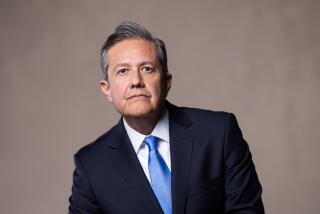Clinton’s Transportation Nominee Gets Mixed Grades : Appointment: Former Denver Mayor Pena’s tenacity is praised, but controversy marks his championing of a new airport.
- Share via
WASHINGTON — Federico F. Pena, named by President-elect Bill Clinton as transportation secretary, has a solid grasp of people-moving problems acquired during a tumultuous, eight-year tenure as Denver’s first Latino mayor.
But critics suggest that, despite his working knowledge of the issues, Pena has not always made the right decisions--or had the political muscle to translate his ideas into action.
Pena, 45, served as the Colorado capital’s mayor from 1983 to 1991. He is credited with cleaning up the city’s air and successfully promoting major public works projects, including a new $3.1-billion airport and a new convention center. The city’s successful campaign to land a National League baseball expansion team also began during Pena’s tenure.
But he failed to stem the tide of urban refugees fleeing to the suburbs, and gang violence and municipal debt remain intractable problems.
The airport, scheduled to open next fall, is his most controversial accomplishment.
Supporters say it is a measure of Pena’s tenacity and ability to forge coalitions among disparate interest groups. “He very aggressively followed his dream to make Denver a great city,” Denver Councilman Ted Hackworth told the Rocky Mountain News after Pena left office. “There was a lot of adversity along the line, but he stuck in there.”
But critics argue that the new airport, which is to become the nation’s largest, was the wrong solution--and demonstrates how Pena tends to attack problems by spending money rather than by seeking more creative solutions.
“We have never needed a new airport; we have needed improved aviation facilities,” Denver attorney Dick Young, one of the project’s principal critics, said last year.
Pena’s stature as a big city mayor made him familiar to many of those who will shape transportation policy on Capitol Hill. The Transportation Department oversees tens of billions of dollars in federal aid for airports, highways, rail lines, bus fleets and mass transit systems, and it also has jurisdiction over the U.S. Coast Guard and the Merchant Marine.
“I’ve known and worked with Mayor Pena for many years on the gamut of transportation issues, from roads to transit to aviation,” said Rep. Norman Y. Mineta (D-San Jose), incoming chairman of the powerful House Committee on Public Works and Transportation. “I know that he is experienced in shaping and implementing policy.”
Mineta and his committee will play a central role in crafting the road, bridge and transit investment program that Clinton promised during his campaign, and that Pena has vowed to champion.
“Federico Pena is a doer,” Clinton said Thursday. He “is exactly the kind of energetic manager who can face the task of repairing and rebuilding our nation’s infrastructure.”
But some members of the transportation community were not so sure.
“I’m told that he’s not a very strong player, and that his one area of real transportation expertise has been that airport, which is of dubious value,” said one senior official of an organization that monitors federal transportation policy, who refused to be identified.
Pena was born on March 15, 1947, in Laredo, Tex. He received a bachelor’s degree from the University of Texas at Austin in 1969 and earned a law degree there three years later. After working in a Denver law firm, Pena was elected to the Colorado General Assembly in 1978. He served there until he was elected Denver mayor at age 35.
In 1988, he survived a recall petition drive after proponents failed to gather enough signatures to force a recall election. The effort stemmed largely from anger over what some perceived as fiscal mismanagement by Pena’s administration.
After leaving office, Pena set up a financial consulting firm and in July he was hired by the Denver law firm of Brownstein, Hyatt, Farber and Strickland.
If he is confirmed as transportation secretary, Pena will confront a host of pressing problems, among them the increasing attempts by foreign airlines to buy interests in ailing U.S. carriers, proposals to invest billions of dollars to rebuild the nation’s roads, bridges and mass transit systems and conflicts between the 1990 amendments to the Clean Air Act and the major 1991 reorganization of federal transportation aid programs.
He has taken a crash course in those issues during the last month, when he served as head of the Clinton “cluster” team examining the nation’s transportation.
More to Read
Sign up for Essential California
The most important California stories and recommendations in your inbox every morning.
You may occasionally receive promotional content from the Los Angeles Times.













